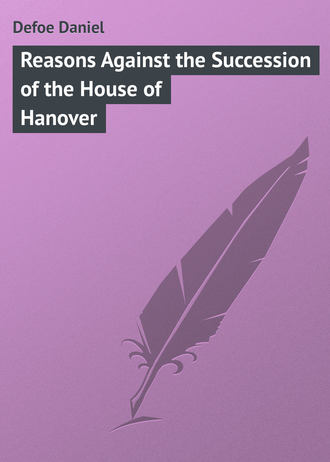
Даниэль Дефо
Reasons Against the Succession of the House of Hanover
Come we in the conclusion of this great matter to one great and main reason, which they say prevails with a great part of the nation at this time to be for the pretender, and which many subtle heads and industrious hands are now busily employed all over the kingdom to improve in the minds of the common people, this is the opinion of the legitimacy of the birth of the pretender; it seems, say these men, that the poor commons of Britain have been all along imposed upon to believe that the person called the pretender was a spurious birth, a child fostered upon the nation by the late king and queen; this delusion was carried on, say they, by the whigs in King William's time, and a mighty stir was made of it to possess the rabbles in favour of the revolution, but nothing was ever made of it; King William, say they, promised in his declaration to have it referred to the decision of the English parliament, but when he obtained the crown he never did anything that way more than encourage the people to spread the delusion by scurrilous pamphlets to amuse the poor commons; have them take a thing for granted which could have no other thing made of it; and so the judging of it in parliament was made a sham only; and the people drinking in the delusion, as they who were in the plot desired, it has passed ever since as if the thing had been sufficiently proved. Now upon a more sedate considering the matter, say they, the case is clear that this person is the real son of King James, and the favourers of the revolution go now upon another foundation, viz., the powers of parliaments to limit the succession; and that succession being limited upon King James's abdication, which they call voluntary; so that now, say they, the question about the legitimacy of the person called the pretender is over, and nothing now is to be said of it; that he is the son of King James, there is, say they, no more room to doubt, and therefore the doctrine of hereditary right taking place, as the ancient professed doctrine of the Church of England, there can be no objection against his being our lawful king; and it is contrary to the said Church of England doctrine to deny it. This, then, is the present reason which the poor ignorant people are taught to give why they are against the protestant succession, and why they are easily persuaded to come into the new scheme of a popish pretender, though at the same time they are all heartily against popery as much as ever.
It becomes necessary now to explain this case a little to the understanding of the common people, and let them know upon what foundation the right of these two parties is founded, and if this be done with plainness and clearness, as by the rights and laws of Englishmen and Britons appertaineth, the said commons of Britain may soon discover whether the succession of the house of Hanover, or the claim of the person called the pretender, is founded best, and which they ought to adhere unto. The first thing it seems to be made clear to the common people is, whether the pretender was the lawful son of King James, yea, or no? And why the contrary to this was not made appear, according to the promises which, they say, though falsely, were made by the late King William? In the first place is to be considered, that the declaration of the said king, when P. of O. putting the said case in the modestest manner possible, had this expression, That there were violent suspicions that the said person was not born of the queen's body, and that the prince resolved to leave the same to the free parliament, to which throughout the said declaration the said prince declared himself ready to refer all the grievances which he came over to redress. I shall give you this in the words of a late learned author upon that head.
That before a free parliament could be obtained, King James withdrew himself, and carried away his pretended son into the hands of the ancient enemies of this nation, and of our religion, viz., the French, there to be educated in the principles of enmity to this his native country.
By which action he not only declined to refer the legitimacy of his said son to the examination of the parliament, as the Prince of Orange had offered in his said declaration, but made such examination altogether useless and impracticable, he himself (King James) not owning it to be a legal parliament, and therefore not consenting to stand by such examination.
By the said abdication, and carrying away his said pretended son into the hands of the French to be educated in popery, &c., he gave the parliament of England and Scotland abundant reason for ever to exclude the said King James and his said pretended son from the government of these realms, or from the succession to the same, and made it absolutely necessary for them to do so, if they would secure the protestant religion to themselves and their posterity; and this without any regard to the doubt, whether he was the lawful son of King James, or no, since it is inconsistent with the constitution of this protestant nation to be governed by a popish prince.
The proof of the legitimacy being thus stated, and all the violent suspicions of his not being born of the queen being thus confirmed by the abdication of King James, come we next to examine how far this abdication could forfeit for this pretender, supposing him to be the real son of King James; this returns upon the right of the parliament to limit the succession, supposing King James had had no son at all; if the abdication be granted a lawfully making the throne vacant, it will be very hard to assign a cause why the parliament might not name a successor while the father was alive, whose right had no violent suspicions attending it, and not why they might not name a successor though the son was living; that the father's abdication forfeited for the son is no part of the question before us; for the father is not said to forfeit his right at all; no one ever questioned his right to reign, nor, had he thought fit to have stayed, could the parliament have named a successor, unless, as in the case of Richard II., he had made a voluntary resignation or renunciation of the crown, and of his people's allegiance; but the king having voluntarily abdicated the throne, this was as effectual a releasing his subjects from their allegiance to him, as if he had read an instrument of resignation, just as King Richard did; all the articles of such a resignation were naturally contained in the said abdication, except the naming the successor, as effectually as if they had been at large repeated; and since the resigning the crown has been formerly practised in England, and there is so eminent an example in our English history of the same, it will questionless be of use to the reader of these sheets to have the particulars of it before his eyes, which for that purpose is here set down at large, as it was done in the presence of a great number of English peers, who attended the king for that purpose, and is as follows: —
In the name of God, Amen. I Richard, by the grace of God, King of England and France, and Lord of Ireland, do hereby acquit and discharge all Archbishops, Bishops, Dukes, Marquisses, and Earls, Barons, Lords, and all other my subjects, both spiritual and secular, of what degree soever, from their oath of fealty and homage, and all other bonds of allegiance, to me due from them and their heirs, and do hereby release them from the said oath and allegiance, so far as they concern my person, for ever.
I also resign all my kingly majesty and dignity, with all the rights and privileges thereunto belonging, and do renounce all the title and claim which I ever had, or have, to them. I also renounce the government of the said kingdom, and the name and royal highness thereunto belonging, freely and wholly, and swearing upon the Evangelists that I will never oppose this my voluntary resignation, nor suffer it to be opposed, as judging myself not unworthily deposed from my regal dignity for my deserts.
This resignation being read again in parliament, they grounded the deposing King Richard upon it, and declared him accordingly deposed, that is, declared the throne vacant; and immediately, by virtue of their own undoubted right of limiting the succession, named the successor. See the form in the history of that time, thus: —
That the throne was vacant by the voluntary cession and just deposition of King Richard II., and that therefore, according to their undoubted power and right so to do, they ought forthwith to the naming a successor to fill the said throne, which they forthwith did, by naming and proclaiming Henry, Duke of Lancaster, to be king, &c.
See the history of the kings of England, vol. fol. 287.
This was the same thing with King James's abdication, and King James's abdication was no less or more than an effectual resignation in form; now the parliament, upon the resignation of the crown by the king, having a manifold and manifest right to supply the throne so become vacant, had no obligation to regard the posterity of the abdicated prince, so far as any of them are concerned in, or involved by, the said abdication, and therefore considered of establishing and limiting the succession, without mentioning the reasons of the descent, having the reasons in themselves; but suppose the son of King James had been allowed legitimate, yet as the father had involved him in the same circumstances with himself, by first carrying him out of the kingdom, and afterwards educating him in the popish religion, he became abdicated also with his father; neither doth the being voluntary or not voluntary alter the case in the least, since in the laws of England a father is allowed to be able to forfeit for himself and for his children, and much more may he make a resignation for himself and his children, as is daily practised and allowed in law in the cutting off entails and remainders, even when the heir entail is in being, and under age. The people of Britain ought not then to suffer themselves to be imposed upon in such a case; for though the pretender were to be owned for the lawful son of King James, yet the abdication of King James his father, and especially his own passive abdication, was as effectual an abdication in him as if he had been of age, and done it voluntarily himself, and shall be allowed to be as binding in all respects in law as an heir in possession cutting off an heir entail. If this is not so, then was the settlement of the crown upon King William and Queen Mary unrighteous, and those two famous princes must be recorded in history for parricides and usurpers; nor will it end there, for the black charge must reach our most gracious sovereign, who must be charged with the horrible crimes of robbery and usurpation; and not the parliament or convention of the estates at the revolution only shall be charged as rebels and traitors to their sovereign, and breakers of the great command of rendering to Cæsar the things that are Cæsar's, but even every parliament since, especially those who have had any hand in placing the entail of the crown upon the person of the queen, and in confirming her majesty's possession thereof since her happy accession; and every act of parliament settling the succession on the house of Hanover must have likewise been guilty of treason and rebellion in a most unnatural manner. This is a heavy charge upon her majesty, and very inconsistent with the great zeal and affection with which all the people of Britain at this time pay their duty and allegiance to her majesty's person, and acknowledge her happy government; this may indeed be thought hard, but it is evident nothing less can be the case, and therefore those people who are so forward to plead the pretender's cause, on account of his being King James's lawful son, can do it upon no other terms than these, viz., to declare that the queen is herself an illegal governor, an usurper of another's right, and therefore ought to be deposed; or, that the hereditary right of princes is no indefeasible thing, but is subjected to the power of limitations by parliament. Thus I think the great difficulty of the pretender's being the rightful son of the late King James is over, and at an end; that it is no part of the needful inquiry relating to the succession, since his father involved him in the fate of his abdication, and many ways rendered him incapable to reign, and out of condition to have any claim; since the power of limiting the succession to the crown is an undoubted right of the parliaments of England and of Scotland respectively. Moreover, his being educated a papist in France, and continuing so, was a just reason why the people of England rejected him, and why they ought to reject him, since, according to that famous vote of the commons in the convention parliament, so often printed, and so often on many accounts quoted, it is declared, That it is inconsistent with the constitution of this protestant kingdom to be governed by a popish prince. Vid. Votes of the Convention, Feb. 2nd, 1688. This vote was carried up by Mr. Hampden to the house of lords the same day as the resolution of all the commons of England. Now, this prince being popish, not only so in his infancy, but continuing so even now, when all the acts of Parliament in Britain have been made to exclude him, his turning protestant now, which his emissaries promise for him, though perhaps without his consent, will not answer at all; for the acts of parliament, or some of them, having been past while he, though of age, remained a papist, and gave no room to expect any other, his turning protestant cannot alter those laws, suppose he should do so; nor is it reasonable that a nation should alter an established succession to their crown whenever he shall think fit to alter or change his religion; if to engage the people of Britain to settle the succession upon him, and receive him as heir, he had thought fit to turn protestant, why did he not declare himself ready to do so before the said succession was settled by so many laws, especially by that irrevocable law of the union of the two kingdoms, and that engagement of the abjuration, of which no human power can absolve us, no act of parliament can repeal it, nor no man break it without wilful perjury.







